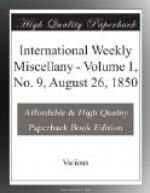Here we must pause. Perhaps it were better altogether to emulate the silence that was maintained then and afterward by the two comrades. But the sexton could not be bribed to entire secrecy, and it was a story he loved to tell, with details we gladly omit, of how Wensleben solemnly performed his task—of how no doubt could any longer exist as to the cause of Hallberg’s death. Those who love the horrible must draw on their own imaginations to supply what we resolutely withhold.
Edward, we believe, never alluded to D’Effernay’s death, and all the awful circumstances attending it, but twice—once, when, with every necessary detail, he and the captain gave their evidence to the legal authorities; and once, with as few details as possible, when he had an interview with the widow of the murderer, the beloved of the victim. The particulars of this interview he never divulged, for he considered Emily’s grief too sacred to be exposed to the prying eyes of the curious and the unfeeling. She left the neighborhood immediately, leaving her worldly affairs in Wensleben’s hands, who soon disposed of the property for her. She returned to her native country, with the resolution of spending the greater part of her wealth in relieving the distresses of others, wisely seeking, in the exercise of piety and benevolence, the only possible alleviation of her own deep and many-sided griefs. For Edward, he was soon pronounced to have recovered entirely from the shock of these terrible events. Of a courageous and energetic disposition, he pursued the duties of his profession with a firm step, and hid his mighty sorrow deep in the recesses of his heart. To the superficial observer, tears, groans, and lamentations are the only proofs of sorrow: and when they subside, the sorrow is said to have passed away also. Thus the captive, immured within the walls of his prison-house, is as one dead to the outward world, though the gaoler be a daily witness to the vitality of affliction.
* * * * *
Paris has been again emptied of its citizens to see M. Poitevin make his second ascent on horseback from the Champ de Mars. To show that he was not fastened to his saddle, the idiot, when some hundred yards up in the air, stood upright on his horse, and saluted the multitude below with both his hands.
* * * * *
PEASANT LIFE IN GERMANY.
We copy the following interesting paragraph from a work just issued in London on “The Social Condition and Education of the People of England and Europe,” by Joseph Kay, of Cambridge University.




